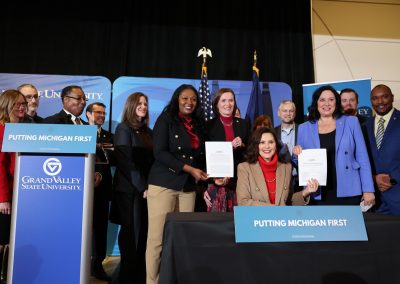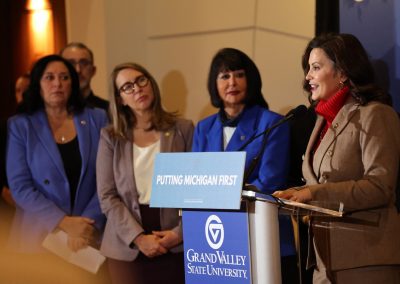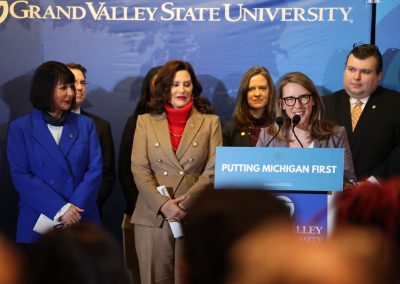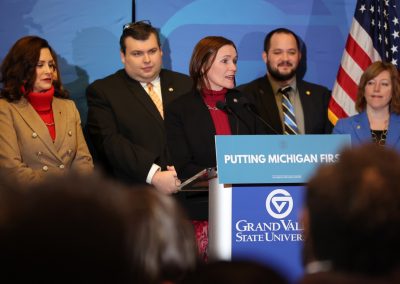GRAND RAPIDS, Mich.—Today, Governor Gretchen Whitmer signed bipartisan bills alleviating school district debt, investing in infrastructure, supporting community colleges and public universities, and lowering costs for families across Michigan on taxes and higher education.
“Across Michigan, we are lowering costs for families, fixing the damn roads, and ensuring every student can get a quality education,” said Governor Whitmer. “These supplemental bills will alleviate school debt in districts that were hardest hit by financial issues, fund projects in universities throughout our state, and fix the damn roads and bridges in communities across Michigan. I look forward to working with my legislative partners to build on the work we’ve done and continue lowering costs, creating jobs, and helping more people build a bright future right here in Michigan.”
“This supplemental budget is full of future-focused investments that maintain and modernize that which we hold dear,” said Senate Majority Leader Winnie Brinks (D-Grand Rapids). “Budgets are one of the most important tools we have to help bring our values to life, and with these bills, Michigan residents will know that we’re advocating for them and their families, the health and safety of our kids, an infrastructure that meets communities’ needs, and to make sure we’re ready for the challenges and demands of tomorrow.”
Lowering Costs for Families
The bills lower costs for families in Inkster, Benton Harbor, Muskegon Heights, Pontiac, and Ypsilanti by providing much-needed debt relief to school districts struggling with financial distress. By alleviating school debt for these districts, residents in these communities will save money on their taxes and spend money in the classroom, helping students learn and improving outcomes with new textbooks, reduced class sizes, and better-paid teachers. The bills also make it easier for students to fill out their FAFSA and receive the Michigan Achievement Scholarship, which went into effect this fall and saves 80% of students thousands of dollars on their college degrees.
“I am proud to see this supplemental funding bill passed into law, which is focused on the wellbeing of our students, educators and schools,” said Senate Appropriations Chairwoman Sarah Anthony (D-Lansing). “Building on the momentum of this year’s historic state budget, our equitable supplemental focuses on enhancing access to clean drinking water, settling school debt in high-need districts and ensuring fiscal responsibility by closing the books and paying off debts. This supplemental reflects our commitment to a thriving education system in Michigan.”
“Bottomline, this legislation promotes better educational opportunities for students and relieves years of financial strain that has limited many Michigan school districts,” state Rep. Felicia Brabec (D-Pittsfield), sponsor of House Bill 4292. “We must continue to safeguard Michigan’s future by ensuring our schools, teachers and students are receiving the investments that uplift them. We will continue to put all people first in a multitude of ways — today is just another reminder of that.”
“This legislation is about more than giving communities a clean start — it’s a promise for better education in Michigan, with smaller classes, improved textbooks and empowered teachers,” said state Rep. Angela Witwer (Delta Township), chair of the House Appropriations Committee. “We’re also simplifying the path to higher education with significant investments in our communities — paving the way for a brighter future for our children.”
“We are grateful to Governor Whitmer and the Michigan Legislature for the passing of this bill,” said Kelley Williams, Superintendent of Pontiac School District. “Our district has worked tirelessly to eliminate our debt. Receiving these funds allows us to now free up money in our General Fund to provide important resources for our students and staff. Consequently, we are proud to be able to say that Pontiac School District is now debt free.”
Supporting Education
The bills fund on-campus projects at Michigan community colleges and public universities, further cementing Michigan’s higher education system as one of the best places to get a degree and the skills needed to land a good-paying job. The projects include the Blue Dot Lab, a technology and digital literacy center at GVSU, centers for entrepreneurship and innovation at Northern Michigan University and U of M Flint, tech and engineering buildings at Eastern Michigan University and Mott and Macomb Community Colleges, and science buildings at Oakland University and Saginaw Valley State University. The bills also fund the Michigan Department of Lifelong Education, Advancement, and Potential, a new state agency tasked with improving outcomes for kids from preschool through postsecondary, and invest in primary health care service for kid and young adults in schools.
“As we enter into a new economy driven by technology and innovation, it’s vitally important we make the investments necessary for our kids to succeed in it,” said State Senator John Cherry (D-Flint). “The funding secured for colleges and universities in Genesee County will allow them to meet the moment and provide students with the unique opportunity to learn about — and develop — the cutting-edge technologies that will define the next era. Ultimately, these investments will secure Genesee County’s place in Michigan’s technology-driven future, helping our region achieve long-term economic prosperity.”
“As evidenced by the work of the Growing Michigan Together Council, we need to more fully fund our universities and community colleges in order to develop the talent of our state and attract young people from all over the world. Today’s signing of these bills does just that,” said state Rep. Natalie Price (D-Berkley), chair of the House Appropriations Joint Capital Outlay Subcommittee. “By investing in the infrastructure of our higher education campuses, we begin to make Michigan a more competitive state.”
“We thank Governor Whitmer and the legislature for investing in the innovation and infrastructure that will power Michigan’s future,” said Philomena V. Mantella, President of Grand Valley State University. “Our Blue Dot Lab will transform the way GVSU uses data science, AI and computer technology to forge new opportunities for our students and our state.”
“This is an exciting opportunity for NMU and we’re thankful the governor and legislature have been so supportive of our efforts to grow the College of Business’s programs while addressing workforce development needs in our region,” said Northern Michigan University President Brock Tessman. “This new facility will bring our fastest growing programs into the heart of campus, providing students better access to valuable support services. But equally important, it will enable us to collaborate with local entrepreneurs and business and industry partners, creating additional internship and work scholar opportunities. We know students are more successful in the marketplace when they have hands-on learning experiences. We also know there’s a talent shortage in the UP. NMU is working on its plan to be a primary resource to help with the Upper Peninsula’s talent shortage, and this facility is an integral part of this plan.”
“Macomb Community College is greatly appreciative of the support of the legislature and the administration in creating the college’s Mobility and Sustainability Center,” said James O. Sawyer IV, Ed.D, President of Macomb Community College. “It is an investment that will help propel our residents to the forefront of in-demand, highly skilled occupations that in turn support the growth of sustainable, flagship industries and economic prosperity.”
Investing in Michigan’s Roads, Bridges, and Infrastructure
The bills invest hundreds of millions of dollars from the Federal Highway Administration to fix the damn roads and bridges across the state of Michigan. The bill also helps Highland Park replace its nearly 120-year-old water system and allows the Great Lakes Water Authority to invest in water infrastructure projects in other communities, supporting good-paying jobs and affordable clean water for Highland Park residents.
“I am grateful to Gov. Whitmer and Chairs Anthony and Witwer for their leadership on this supplemental budget, which includes $30 million for Highland Park water infrastructure, as part of the agreement between Highland Park, the state and the Great Lakes Water Authority. This is a hugely important step for Highland Park residents and everyone within the GLWA system,” said State Senator Stephanie Chang (D-Detroit). “Access to water is critical for every Michigan community. By sending state funding to fix Highland Park’s water infrastructure, we are moving the whole GLWA system toward a stronger, more fiscally sustainable future. Highland Park residents have long called for a resolution to this issue and I am very proud to have been a part of making this happen.”
“Today’s supplemental budget signing is a major win for Highland Park and communities across Michigan. Investing hundreds of millions from the Federal Highway Administration, this legislation helps literally pave the way to more good-paying jobs and stronger infrastructure in every corner of our state,” said state Rep. Mike McFall (D-Hazel Park), who represents Highland Park. “Close to my home, this legislation makes significant investments in Highland Park’s nearly 120-year-old water infrastructure. For too long, residents were forced to pay for water that never reached them. No longer. After extensive collaboration with and advocacy from community members, I’m excited that residents will be able to have reliable water access they can count on.”




